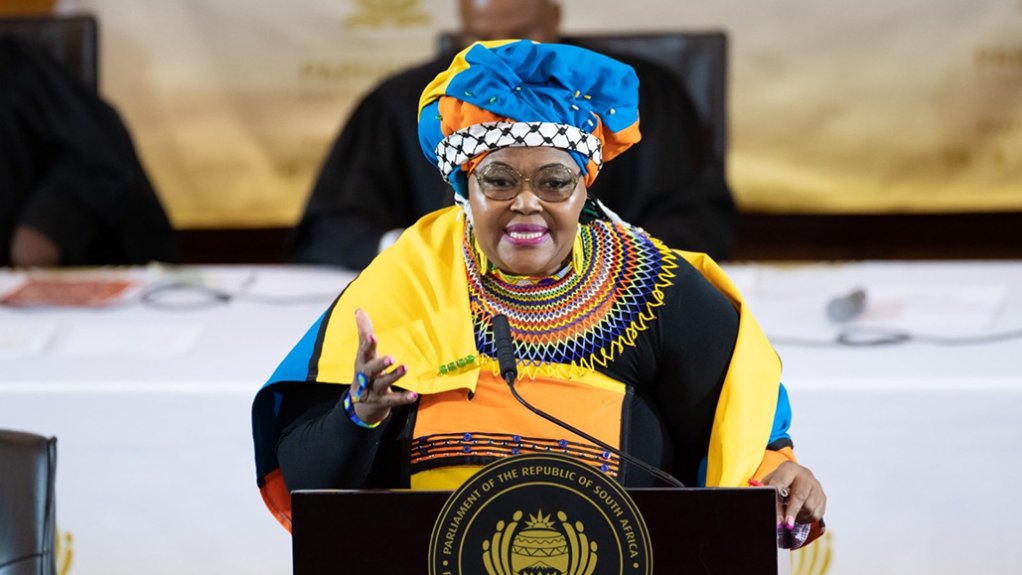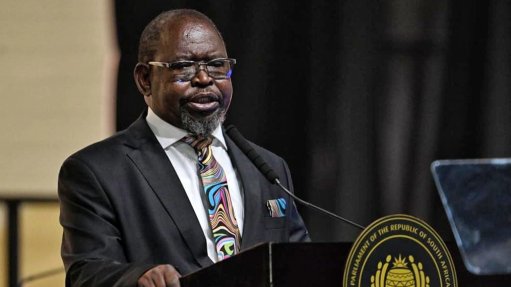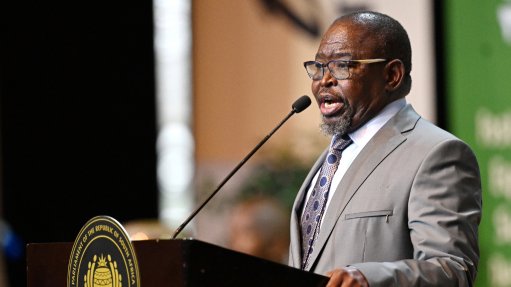Majodina outlines in budget vote the work on bulk water projects that is ongoing
While the Department of Water and Sanitation (DWS) progresses the establishment of the South African National Water Resources Infrastructure Agency (NWRIA), it continues to ensure that investment into current national water resource infrastructure and projects continues uninterrupted.
The NWRIA will ultimately be responsible for financing, developing and managing the country’s water infrastructure once it is operational in April 2026.
During her Budget Vote on Wednesday evening, Water and Sanitation Minister Pemmy Majodina said that the Trans-Caledon Tunnel Authority (TCTA), which will be disestablished once the NWRIA is formed, has been raising finance from the private sector and development finance institutions for a range of projects.
“We also made a commitment to continue unblocking stalled projects and to accelerate their implementation,” she said.
These include the second phase of the Lesotho Highlands Water Project, which is fully funded off-budget through the TCTA. The R53-billion project is currently 50% complete, with expectations that it will be completed by 2029.
The loans will be serviced using revenue from the sale of water to municipalities, irrigators and industrial users.
Other projects, such as the uMkhomazi project in KwaZulu-Natal, are being partly financed by government and partly financed by borrowing.
The relevant municipalities have entered into offtake agreements with the uMngeni-uThukela Water Board and the TCTA, which provide commitments to purchase the water from the project, which in turn has provided the security required to enable the TCTA to start the process of raising funding on the financial markets for the project.
Design work for the dam and conveyance infrastructure is currently underway, and commissioning is expected in 2032 at an estimated cost of R27-billion.
The raising of the Clanwilliam and Tzaneen dams, and the associated works, also continue.
Fully funded from the fiscus, the raising of the Clanwilliam dam by 13 m is 40% complete, with expectations of completion by October 2028 at an estimated cost of R7-billion.
Also funded from the fiscus, the raising of the Tzaneen dam by 3 m is 46% complete and is estimated to be completed by March next year at a cost of R760-million.
In addition, the Mzimvubu water project, in the Eastern Cape, is also progressing, with the construction of access roads currently 89% complete and overall progress on the project about 8% complete.
The DWS has completed the design of the dam; obtained a licence to construct from the Dam Safety Office; started site clearance; and is currently preparing to start the construction of the dam wall.
The project is also fully funded from the fiscus, with an estimated completion date of 2030 at a cost of R8.1-billion.
Funding for the R12.4-billion Mokolo and Crocodile River (West) Water Augmentation Project Phase 2A, in Lephalale, has been secured.
It is a blended finance project, with part of the funding from the fiscus, but most of the required funding has been raised by the TCTA in the financial markets.
The construction contractor has been appointed and construction is set to start in August 2025, with commissioning in 2029.
The DWS also has several projects under design, including the R612-million Coerney dam project, the R957-million Zalu dam project, and the R2.2-billion Foxwood dam project.
All three projects are expected to be completed by 2029.
Funding for the Coerney and Zalu dam projects has been secured from the fiscus, while funding for the Foxwood dam project has not yet been secured, with the DWS set to apply to the National Treasury's Budget Facility for Infrastructure for funding.
The designs for the R3.8-billion Nwamitwa dam project has been completed, and the DWS has requested the TCTA to investigate the feasibility of partially or fully funding this project off-budget, based on offtake agreements with irrigators.
The R1.8-billion Cwabeni Off-Channel storage dam project, which is to be commissioned in 2030, will be financed through borrowing by the uMngeni-uThukela Water Board. The loans will be paid off using revenue from the sale of water from the dam.
The uMngeni-uThukela Water Board will also raise the funds required for the R795-million Stephen Dlamini dam, which is due for commissioning in 2030.
Similarly, for the R1.2-billion Berg River-Voëlvlei Augmentation Scheme, planned for completion in 2028, offtake agreements have been signed with irrigators and the City of Cape Town, and the TCTA will raise the required funding for the project on the financial markets, on the basis of the signed offtake agreements.
Meanwhile, Majodina announced that, in this financial year, 110 bulk infrastructure projects, at various stages of implementation, across all provinces will be funded through the Regional Bulk Infrastructure Grant.
Further, the Water Services Infrastructure Grant will be used to fund 391 projects, with 163 planned to be completed in the current financial year.
In the Eastern Cape, the R792-million Ngqamakhwe Regional Bulk Water Supply Scheme Phase 5A, is currently under construction, and, at over 40% progress, is expected to be fully completed by June 2027.
Another major project is the R423-million Ndlambe project, which is 81% complete, and is scheduled for completion by the end of 2026.
In the Free State, the R1.6-billion second phase of the Welbedacht pipeline project, comprising a 71.3 km pipeline, is expected to start in August 2026 and be completed in August 2031.
Phase 1 was completed in June 2025 by Vaal Central Water Board at a cost of R585-million.
Funding is still to be raised for the second phase, and the department and Vaal Central Water will work with the Infrastructure Fund to apply to the Budget Facility for Infrastructure for partial funding for the project, with the remainder of the funding raised in the markets.
The department, through the Vaal Central Water Board, will continue to support the Maluti-a-Phofung and Matjhabeng local municipalities with a range of projects, with R2.4-billion and R3.5-billion allocated respectively.
In Limpopo, the department will continue to accelerate implementation of a range of major water services projects, including the R4.8-billion Giyani water project.
In addition, Lepelle Northern Water is implementing the R18-billion Olifants Ebenezer project. The fully-funded R1.4-billion Phase 1A is nearing completion.
In the Zululand district municipality, in KwaZulu-Natal, the department is accelerating the R4.9-billion Mandlakazi Bulk Water Supply Scheme.
Further, through the uMngeni-uThukela Water Board, the DWS is supporting the uMkhanyakude district municipality, which was placed under Section 139, with the implementation of water infrastructure projects, undertaken through a Section 63 intervention, and expected to cost R1.3-billion and be concluded in September 2027.
During the current financial year, the DWS will complete implementation of the R2-billion Loskop Regional Bulk Water Supply Scheme, in Mpumalanga, which is currently 78% complete.
In Gauteng, Rand Water continues to assist the Emfuleni and Midvaal local municipalities with a range of projects to address the sanitation crisis in the Vaal.
The total investment is estimated at R4.7-billion over the multi-year implementation.
“For sustainable water and sanitation services in Emfuleni, the Minister of Finance and I have approved a partnership between Rand Water and Emfuleni local municipality in the form of a Special Purpose Vehicle that will be the Water Services Provider in Emfuleni on a long-term contract, with the aim of improving revenue collection, management, operation and maintenance of water services in Emfuleni,” Majodina commented.
Meanwhile, the department is providing funding to Sol Plaatje local municipality for its R2.7-billion integrated water supply project which started in 2023 and is expected to be completed by March 2030. The project is currently about 12% complete, with work packages in various implementation stages.
Article Enquiry
Email Article
Save Article
Feedback
To advertise email advertising@creamermedia.co.za or click here
Press Office
Announcements
What's On
Subscribe to improve your user experience...
Option 1 (equivalent of R125 a month):
Receive a weekly copy of Creamer Media's Engineering News & Mining Weekly magazine
(print copy for those in South Africa and e-magazine for those outside of South Africa)
Receive daily email newsletters
Access to full search results
Access archive of magazine back copies
Access to Projects in Progress
Access to ONE Research Report of your choice in PDF format
Option 2 (equivalent of R375 a month):
All benefits from Option 1
PLUS
Access to Creamer Media's Research Channel Africa for ALL Research Reports, in PDF format, on various industrial and mining sectors
including Electricity; Water; Energy Transition; Hydrogen; Roads, Rail and Ports; Coal; Gold; Platinum; Battery Metals; etc.
Already a subscriber?
Forgotten your password?
Receive weekly copy of Creamer Media's Engineering News & Mining Weekly magazine (print copy for those in South Africa and e-magazine for those outside of South Africa)
➕
Recieve daily email newsletters
➕
Access to full search results
➕
Access archive of magazine back copies
➕
Access to Projects in Progress
➕
Access to ONE Research Report of your choice in PDF format
RESEARCH CHANNEL AFRICA
R4500 (equivalent of R375 a month)
SUBSCRIBEAll benefits from Option 1
➕
Access to Creamer Media's Research Channel Africa for ALL Research Reports on various industrial and mining sectors, in PDF format, including on:
Electricity
➕
Water
➕
Energy Transition
➕
Hydrogen
➕
Roads, Rail and Ports
➕
Coal
➕
Gold
➕
Platinum
➕
Battery Metals
➕
etc.
Receive all benefits from Option 1 or Option 2 delivered to numerous people at your company
➕
Multiple User names and Passwords for simultaneous log-ins
➕
Intranet integration access to all in your organisation





















